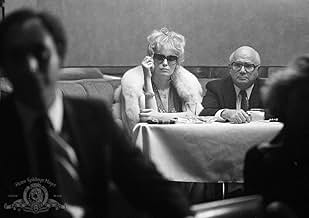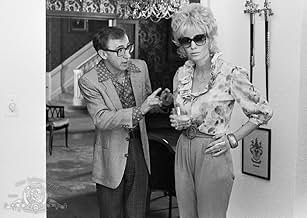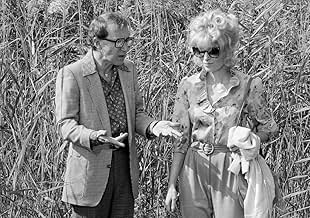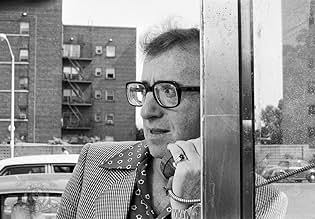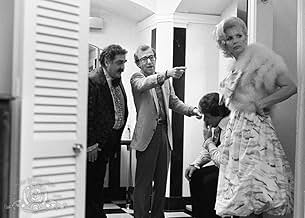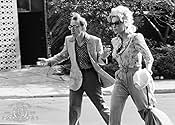Nei suoi tentativi di riconciliare un cantante di lounge con la sua amante, uno sfortunato agente di talento viene scambiato per il suo amante da un gangster geloso.Nei suoi tentativi di riconciliare un cantante di lounge con la sua amante, uno sfortunato agente di talento viene scambiato per il suo amante da un gangster geloso.Nei suoi tentativi di riconciliare un cantante di lounge con la sua amante, uno sfortunato agente di talento viene scambiato per il suo amante da un gangster geloso.
- Regia
- Sceneggiatura
- Star
- Candidato a 2 Oscar
- 3 vittorie e 5 candidature totali
- Johnny's Mother
- (as Gina DeAngelis)
Recensioni in evidenza
The story of the film is told by a bunch of entertainers at the Carnegie Deli in Manhattan, reminiscing about Rose (Allen), an agent for the most obscure acts in New York back in the '50s and '60s. One of them claims to have the best Danny Rose story and his telling serves as narration to the film.
The story revolves around Rose and his biggest talent, Lou Canova (Nick Apollo Forte), an old-fashioned Italian crooner doing covers of Sinatra and all kinds of classic tunes from what back then was considered a "bygone era," but Lou is having a resurgence. Problem is he's an alcoholic and a womanizer. He insists on having the woman he's having an affair with attend his big performance at the Waldorf (that could get him a national gig). Other problem is, this Tina (Mia Farrow) was told Lou was cheating on her, so now she's run off to her Italian mob family and through strange circumstances, the mob wants to knock Danny off.
There are elements of classic comedy here, which is why the black and white works for "Danny Rose." At the same time, it's a nostalgic film (the early '80s was full of that for Allen) and an intimate one.
Without spoiling too much, the key to "Danny Rose" relies in the conflict between self- interest and dependency on others. In a way, it's Allen's way of saying thank you or perhaps apologizing to those that have been part of his personal journey.
No one does it alone, especially not Danny Rose, a character whose living is dependent on the talents and aspirations of others and who lives solely by the advice he remembers from deceased relatives. Then there's Lou, who can't perform unless Tina is there but loves his wife dearly, and then Tina, who can't make any major decision without consulting a psychic elderly woman.
"Danny Rose" has some memorable Woody Allen quotes and classically comical situations such as he and Farrow's Tina "wriggling" their way out of some ropes tying them together as a former escape artist client of Danny's used to say, or when they're chased into the Macy's Day Parade balloon warehouse.
The film is simplistic but truthful and it's nice to see Allen make a point that's so universal instead of one about affluent people solving their life crises.
Allen and Farrow both give career performances. Nick Apollo Forte is absolutely wonderful. The casting, locations, directing, and performances could not be better. Every aspiring film maker should study this film as the perfect example of a powerful "little" film. Watch the film several times and you'll like it more each time. It is may favorite Woody Allen film (everything else is a distant second) and one of my favorite films of all time. The film's lack of commercial and critical success speaks volumes about the sensibilities and values of our society.
The film begins with a gaggle of older Borscht Belt-caliber comedians sitting around a table at Manhattan's Carnegie Deli, trading stories about Danny Rose. Rose loves acts that are a bit "outside" the mainstream, so there is no shortage of laughs from our storytellers as they remember his one-legged tap dancer, his blind xylophonist, and so on.
After about 10 minutes or so of general reminiscing interspersed with footage of Rose portraying the stories, one man says he's got the Rose story to top them all, which launches us into the "film proper". It's a tale about Rose and his client Lou Canova (Nick Apollo Forte), a Louis Prima-styled singer who had one hit, "Agita", in the 1950s, but who is a has-been when Rose meets him. Broadway Danny Rose is primarily the story of how Rose gets mixed up in a comically deteriorating situation with Canova's mistress, Tina Vitale (Mia Farrow), while trying to ensure that she attends a career-restoring gig, despite the fact that Canova's wife is also going to be there.
Allen treats us to some entertaining postmodernist layering in the beginning. It seems like a normal enough film in the first few moments, but quickly turns into almost a mock documentary as our deli comedians talk about Rose. The Rose material is really all flashback, and even when it "takes over" the film during the Canova story, it still has a mock documentary feel at first. Eventually the Canova story proceeds as any film would, but the bookended storytellers emphasize the nostalgic tone of the film.
Allen is drilling in that fact that we're reminiscing. He wants the audience to reminisce about the tone of the main story, even if they don't have personal memories of the era or that segment of the entertainment industry. For Allen, the film has strong resemblances to some aspects of his personal experience as an up and coming standup comedian, and he even draws parallels such as a Carnegie Deli sandwich being named after Danny Rose in the film--in real life, you can eat a sandwich named after Woody Allen at the Carnegie Deli. Having characters in the film reminisce about what turns out to be a reminiscent mode in a flashback helps audience members outside of the relevant "nostalgia zone" to get into the proper mood.
Interestingly for this goal, even though Allen goes to the trouble to shoot the film in black & white, he doesn't attempt to remove blatantly anachronistic elements--as if he's trying to remind us that this is still artificial reminiscing. For example, a scene that takes place in a Times Square office features a window through which we can see the large flashing "Fuji" sign. On the other hand, Allen also exploits the fact that Broadway Danny Rose was shot just as the recent family-friendly gentrification of the New York City area was taking hold, as there are important scenes on the old, dilapidated West Side docks and in a Jersey City that still looks comparatively like a barren wasteland.
One of the reasons that this film is so charming is that even though Danny Rose is a loser, he's a good-hearted loser with an admirable philosophy of life, despite the fact that he's continually abused and/or given the short shrift by those he helps. Allen is still doing his "neurotic Jew" schtick here, but whereas he tends to draw that character as self-centered in other films, in Broadway Danny Rose he's almost completely altruistic. He actually tries to persuade other characters, who happen to be self-centered, to change their outlooks. He's a Tod Browning to a cadre of performing freaks, promoting and embracing them, even if to most eyes it has to involve exploiting them at the same time. But he admirably can't help seeing the best in everyone, encouraging them and honestly believing that they should be in a "higher position" than they are now. He even does this with the non-performing Tina when she makes some decorating suggestions about his apartment--suddenly, he wants to manage an interior decorating career for her, saying that she should be doing "hotels and embassies".
As is typical for an Allen film, Broadway Danny Rose is filled with amazing, often symbolic cinematography, by frequent collaborator (from 1977's Annie Hall through 1985's The Purple Rose of Cairo) Gordon Willis. It's also full of great performances (including Allen's) and it's infused with Allen's trademark pre-bop jazz, in this case heavily depending on variations of the Prima-like "Agita", somewhat similar to how "In A Persian Market" was used as a theme in the later Curse of the Jade Scorpion (2001).
If you like Allen's typical style, you've surely seen this film. If you're wondering where to start or dip into Allen's works further, Broadway Danny Rose is as good a place to begin as any.
Danny's problem is that as soon as one of his clients makes it to the top, they would drop him in favor of a big-name agent. Danny stuck with a drinking, self-centered Italian crooner Lou who is attempting (and just about to make it) a comeback, and Danny, being a loyal and protective agent, unwittingly gets involved with the singer's girlfriend Tina whose family has a long memory and strong resemblance to Soprano family. No wonder poor Danny needs "a valium the size of a hockey puck". Mia Farrow is almost unrecognizable as a tough and vulgar (but not a dumb) blonde. Her philosophy is her way of life "It's over quick, so have a good time. You see what you want, go for it. Don't pay attention to anyone else. And do it to the other guy first 'cause if you don't he'll do it to you." She obviously acts on her words but in the end of the movie she realizes that the things which count most in life are "acceptance, forgiveness, love" which is Danny's philosophy. She was cast against the type and it worked brilliantly in the funny but touchingly nostalgic movie. "Broadway Danny Rose" is a sparkling gem from the writer/director/star, one and only Woody Allen. I never expect anything else from him.
It's movies like these that come along once in a blue moon that make the wait and the heap of junk one is so often subjected to, worth it.
Lo sapevi?
- QuizThe reason Mia Farrow wears sunglasses most of the film is that Woody Allen did not feel she could pass herself as a tough Italian "broad", so he had her wear the sunglasses most of the film to hide her eyes, making her seem more sultry and mysterious.
- BlooperIn one scene, Danny can be seen walking past a movie theater, that advertises Il serpente alato (1982) and Halloween III - Il signore della notte (1982) on the marquee. However, the film is supposed to take place in the late 1960s.
- Citazioni
Danny Rose: You know what my philosophy of life is? That it's important to have some laughs, no question about it, but you gotta suffer a little too' because, otherwise you miss the whole point to life. And that's how I feel
Tina Vitale: Know what my philosophy of life is?
Danny Rose: I can imagine.
Tina Vitale: It's over quick, so have a good time. You see want you want, you go for it. Don't pay any attention to anyone else. And do it to the other guy first, because, if you don't, he'll do it to you.
Danny Rose: This is a philosophy of life? This is - it sounds like the screenplay to "Murder Incorporated".
- Curiosità sui creditiThe guys in the Carnegie Deli continue to banter over part of the end credits.
I più visti
- How long is Broadway Danny Rose?Powered by Alexa
Dettagli
- Data di uscita
- Paese di origine
- Lingue
- Celebre anche come
- Brodvejski Danny Rose
- Luoghi delle riprese
- Aziende produttrici
- Vedi altri crediti dell’azienda su IMDbPro
Botteghino
- Budget
- 8.000.000 USD (previsto)
- Lordo Stati Uniti e Canada
- 10.600.497 USD
- Fine settimana di apertura Stati Uniti e Canada
- 953.794 USD
- 29 gen 1984
- Lordo in tutto il mondo
- 10.600.497 USD
- Tempo di esecuzione1 ora 24 minuti
- Colore
- Mix di suoni
- Proporzioni
- 1.85 : 1
Contribuisci a questa pagina



